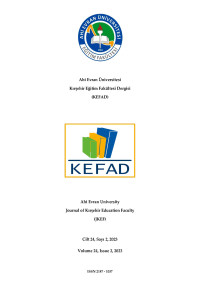İlkokul Matematik Eğitimine Yönelik Geliştirilen STEM Etkinliği ve Uygulamaya Dair Öğrenci Görüşleri
Abstract
Bu araştırmanın amacı ilkokul matematik eğitimine yönelik STEM etkinliği geliştirmek ve okul sonrası gerçekleştirilen STEM etkinliğinin sonuçlarını ortaya koymaktır. Bu araştırmada nitel araştırma desenlerinden biri olan durum çalışması deseni kullanılmıştır. Araştırmanın çalışma grubunu 2019-2020 öğretim yılı güz dönemimde bir devlet okulunda öğrenim gören ve okul sonrası STEM kulübüne gönüllü olarak katılan 3. ve 4. sınıf öğrencileri oluşturmaktadır. Çalışma grubu “ölçüt örneklem” tekniği ile belirlenmiş olup, kararlaştı rılan ölçütlere göre 15 kız, 14 erkek olmak üzere toplamda 29 öğrenci, katılımcı olarak belirlenmiştir.Bu araştırmada veri toplama araçları olarak odak grup görüşmesi, araştırmacı günlüğü, öğrenci günlükleri ve öğrenci ürünlerinden yararlanılmıştır. 4 hafta ve her hafta iki ders saati olmak üzere toplam 8 ders saati süren uygulama sonunda, öğrenciler ile odak grup görüşmeleri gerçekleştirilmiştir. İlkokul öğrencileri ile yapılan odak grup görüşmesi ve araştırmacı-öğrenci günlükleri içerik analizi yöntemi kullanılarak çözümlenmiştir. Veriler incelendiğinde, öğrencilerin genel olarak STEM etkinlik sürecinden keyif aldıkları, süreçte bazı noktalarda zorlansalar da işbirliği ile tasarım sürecini başarılı bir şekilde tamamladıkları görülmüştür.
Keywords
Matematik Eğitimi İlkokul STEM Eğitimi Mühendis Tasarım Süreci Primary Education Engineering Design Process
References
- Wang, H. (2012). A new era of science education: science teachers‘ perceptions and classroom practices of science, technology, engineering, and mathematics (STEM) integration (Unpublished doctorate thesis), University of Minnesota, United States of America.
- Yıldırım, A., & Şimsek, H. (2018). Nitel araştırma yöntemleri. Seçkin Yayıncılık.
- Yin, R. K. (1984). Case study research: Design and methods. Sage Publications.
STEM Activity Developed for Primary School Mathematics Education and Student Opinions on the Application
Abstract
The purpose of this research is to reveal the results of mathematics-focused STEM activities applied after school. Case study design, one of the qualitative research designs, was used in this study. The study group of the research consists of 3rd and 4th grade students studying at a public school in the fall semester of the 2019-2020 academic year and voluntarily participating in the after-school STEM club. The study group was determined by the "criterion sampling" technique, and as a result of the technique, a total of 29 students, 15 girls and 14 boys, were determined as participants. In this research, focus group interview, researcher diary, and student diaries were used as data collection tools. The application lasted 4 weeks, 8 hours, Focus group interview data with study group students and the data in the researcher-student diaries were obtained by content analysis. The results showed that the students generally enjoyed the activity process, and although they had difficulties at some points, they successfully completed the process with cooperation.
References
- Wang, H. (2012). A new era of science education: science teachers‘ perceptions and classroom practices of science, technology, engineering, and mathematics (STEM) integration (Unpublished doctorate thesis), University of Minnesota, United States of America.
- Yıldırım, A., & Şimsek, H. (2018). Nitel araştırma yöntemleri. Seçkin Yayıncılık.
- Yin, R. K. (1984). Case study research: Design and methods. Sage Publications.
Details
| Primary Language | Turkish |
|---|---|
| Subjects | Other Fields of Education |
| Journal Section | Research Articles |
| Authors | |
| Publication Date | August 31, 2023 |
| Published in Issue | Year 2023 Volume: 24 Issue: 2 |


